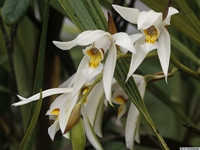Orchids & Mushroom Story
Saturday, November 6, 2010
Mushroom
A mushroom is the fleshy, spore-bearing fruiting body of a fungus, typically produced above ground on soil or on its food source. Mushrooms are not plants: they are a fungus. They eat organic matter, they do not photosynthesize like plants do. The standard for the name "mushroom" is the cultivated white button mushroom, Agaricus bisporus, hence the word mushroom is most often applied to those fungi (Basidiomycota, Agaricomycetes) that have a stem (stipe), a cap (pileus), and gills (lamellae, sing. lamella) on the underside of the cap.
"Mushroom" describes a variety of gilled fungi, with or without stems, and the term is used even more generally, to describe both the fleshy fruiting bodies of some Ascomycota and the woody or leathery fruiting bodies of some Basidiomycota, depending upon the context of the word.
Forms deviating from the standard morphology usually have more specific names, such as "puffball", "stinkhorn", and "morel", and gilled mushrooms themselves are often called "agarics" in reference to their similarity to Agaricus or their place Agaricales. By extension, the term "mushroom" can also designate the entire fungus when in culture or the thallus (called a mycelium) of species forming the fruiting bodies called mushrooms, or the species itself.
Orchids that found in Thailand
Genus of orchids that found in Thailand
1.Acampe
2.Aerides
3.Arachnis
4.Ascocentrum
5.Bulbophyllum
6.Calanthe
7.Cattleya & allied genera ,consists of eight sub-genera are :
7.1.Brassavola
7.2.Broughtonia
7.3.Cattleya
7.4.Diacrium
7.5.Epidendrum
7.6.Laelia
7.7.Schomburgkia
7.8.Sophronitis
8.Coelogyne
9.Cymbidlium
10.Dendrobium
11.Doritis
12.Grammatophyllum
13.Habenaria
14.Oncidium
15.Pecteilis
16.Paphiopedilum
17.Phalaenopsis
18.Renanthera
19.Rhynchostylis
20.Spathoglottis
21.Trichoglottis
22.Vanda
23.Vandopsis
1.Acampe
 |
| Acampe |
2.Aerides
 |
| Aerides |
3.Arachnis
 |
| Arachnis |
4.Ascocentrum
 |
| Ascocentrum |
5.Bulbophyllum
 |
| Bulbophyllum |
6.Calanthe
 |
| Calanthe |
7.Cattleya & allied genera ,consists of eight sub-genera are :
7.1.Brassavola
 |
| Brassavola |
7.2.Broughtonia
 |
| Broughtonia |
 |
| Cattleya |
7.4.Diacrium
 |
| Diacrium |
7.5.Epidendrum
 |
| Epidendrum |
7.6.Laelia
 |
| Laelia |
7.7.Schomburgkia
 |
| Schomburgkia |
7.8.Sophronitis
 |
| Sophronitis |
 |
| Coelogyne |
9.Cymbidlium
 |
| Cymbidlium |
10.Dendrobium
 |
| Dendrobium |
11.Doritis
 |
| Doritis |
12.Grammatophyllum
 |
| Grammatophyllum |
13.Habenaria
 |
| Habenaria |
14.Oncidium
 |
| Oncidium |
15.Pecteilis
 |
| Pecteilis |
16.Paphiopedilum
 |
| Paphiopedilum |
17.Phalaenopsis
 |
| Phalaenopsis |
18.Renanthera
 |
| Renanthera |
19.Rhynchostylis
 |
| Rhynchostylis |
20.Spathoglottis
 |
| Spathoglottis |
21.Trichoglottis
 |
| Trichoglottis |
22.Vanda
 |
| Vanda |
23.Vandopsis
 |
| VandaVandopsis |
Friday, November 5, 2010
Variety of Orchids
Common Name : Orchid
Orchidaceae, commonly referred to as the Orchid family, is a morphologically diverse and widespread family of monocots. It is currently believed to be the second largest family of flowering plants (only the Asteraceae is larger)
The complex mechanisms which orchids evolve to achieve cross-pollination were investigated by Charles Darwin and described in his 1862 book Fertilisation of Orchids.Distribution
Orchidaceae are cosmopolitan, occurring in almost every habitat apart from deserts and glaciers. The great majority are to be found in the tropics, mostly Asia, South America and Central America, but they are also found above the Arctic Circle, in southern Patagonia, and even two species of Nematoceras on Macquarie Island, close to Antarctica.
The following list gives a rough overview of their distribution:
tropical America: 250 to 270 genera
tropical Asia: 260 to 300 genera
tropical Africa: 230 to 270 genera
Oceania: 50 to 70 genera
Europe and temperate Asia: 40 to 60 genera
North America: 20 to 26 genera
The following are amongst the most notable genera of the orchid family:
Aa Abdominea Acampe
Acanthephippium Aceratorchis Acianthus
Acineta Acrorchis Ada
Aerangis Aeranthes Aerides
Aganisia Agrostophyllum Amitostigma
Anacamptis Ancistrochilus Angraecum
Anguloa Ansellia Aorchi
Aplectrum Arethusa Armodorum
Ascocenda Ascocentrum Ascoglossum
Australorchis Auxopus Baptistonia
Barbrodia Barkeria Barlia
Bartholina Beloglottis Biermannia
Bletilla Brassavola Brassia
Bulbophyllum Calypso Catasetum
Cattleya Cirrhopetalum Cleisostoma
Clowesia Coelogyne Coryanthes
Cymbidium Cyrtopodium Cypripedium
Dactylorhiza Dendrobium Disa
Dracula Encyclia Epidendrum
Eria Eulophia Gongora
Goodyera Grammatophyllum Gymnadenia
Habenaria Herschelia Laelia
Lepanthes Liparis Ludisia
Lycaste Masdevallia Maxillaria
Meliorchis Mexipedium Miltonia
Mormodes Odontoglossum Oeceoclades
Oncidium Ophrys Orchis
Paphiopedilum Paraphalaenopsis Peristeria
Phaius Phalaenopsis Pholidota
Phragmipedium Platanthera Pleione
Pleurothallis Promenaea Pterostylis
Renanthera Renantherella Restrepia
Restrepiella Rhynchostylis Roezliella
Saccolabium Sarcochilus Satyrium
Selenipedium Serapias Sophronitis
Spiranthes Stanhopea Stelis
Thrixspermum Tolumnia Trias (genus)
Trichocentrum Trichoglottis Vanda
Vanilla Zeuxine Zygopetalum
 |
| Phalaenopsis |
 |
| Paphiopedilum |
 |
| Cymbidium |
 |
| Laelia |
 |
| Dendrobium |
 |
| Epidendrum |
 |
| Vanda |
 |
| Brassia |
 |
| Bulbophyllum |
 |
| Cattleya |
 |
| Catasetum |
 |
| Sophronitis |
 |
| Miltonia |
 |
| Phaius |
 |
| Oncidium |
 |
| Anguloa |
Subscribe to:
Comments (Atom)



